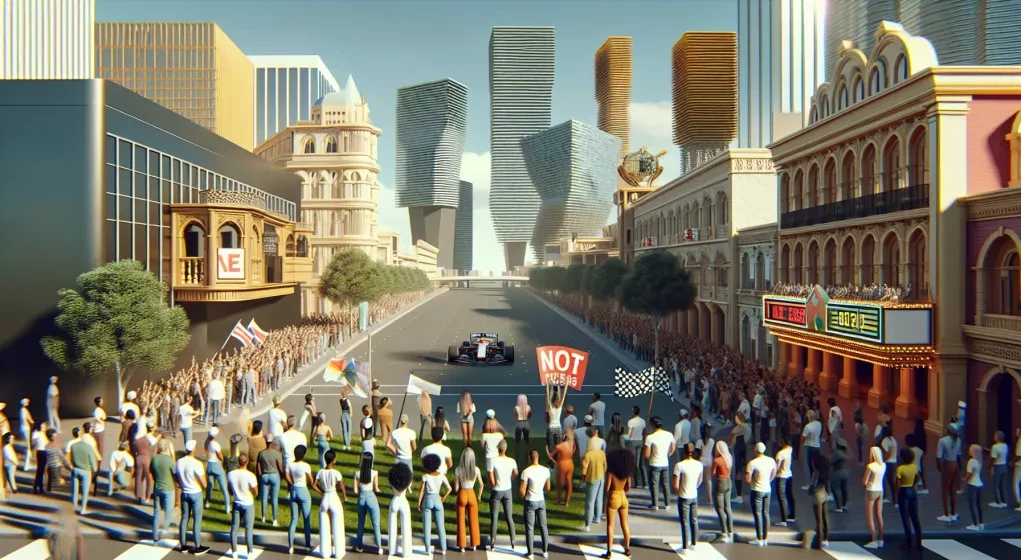In an undercurrent of dissent, bubbling up against the high-octane thrills of Formula One, a burgeoning movement is taking shape on the famed streets of Sin City. A new call to arms has emerged, echoes striking through the neon glow—a crescendoing chant materializing in the form of a Change.org petition that beckons the Clark County Commission to reevaluate the spectacle that is the Las Vegas Grand Prix.
As the city anticipates the roar of engines for the second staging of this event, set to slice through the heartbeat of the strip from November 21st to the 23rd, a band of local entrepreneurs—stalwarts of the community—are rising in opposition, brandishing a narrative of loss beneath the shadow of economic triumph. These custodians of small commerce are unifying their voices in resistance, claiming an eye-watering $30 million hemorrhage in revenue as a repercussion of last year’s Grand Prix machinations—a stark contrast to the lofty claim of a $1.5 billion injection into the city’s veins touted by the racing entity.
The mastermind behind this digital insurrection, one Lisa Mayo-DeRiso—no stranger to the arena of public relations—stands as the standard-bearer for a coalition of at least six business proprietors. Their grievances, crystallized by an appeal launched on the 3rd of May, speak to an austere narrative: devastation wrought by race preparations, alleging an event riddled not with victory laps, but with detrimental impacts upon local businesses, the hardworking employees that energize the Strip, and the very fabric of transportation services woven into the tableau of Las Vegas.
Momentum for this cause gathers pace, signature by signature, now surpassing 1,350 pledges of support, and with an eye firmly set toward the 1,500 milestone. This collective gesture—though devoid of strictly legal bindings—holds the potential to exert considerable political clout.
At the heart of the plight, the 2023 event’s groundwork, which sliced into the calendar year as early as April, caged local enterprises within the steel embrace of a sprawling circuit for the better part of six months. A particular Shell Station’s tale echoes amid a chorus of discontent, lamenting the bridge that loomed over its existence—courtesy of F1—at the intersection of Flamingo Road, a behemoth that steered patrons away and left profits languishing in the shadows.
A retrospective look paints a picture of bleak midwinter, with the bridge dismantled only in the brief reprieve before Super Bowl Sunday, yet foreboding looms as plans to resurrect this monolith solidify with each Grand Prix’s advent.
The reflection of one Magdy Amer, a restaurateur whose dreams dissipated along with the customers at Tex Mex Tquila, resonates with a somber cadence, her testament bearing witness to a livelihood decimated, delivered to KLAS-TV in Las Vegas, “We were not doing even 10 percent of what we were doing. We were losing money every day.”
The petitioners’ demands slice through the hum of bureaucratic ambivalence: they seek to forestall the County’s approval of special use permits—the lifeblood of street closures—until equitable and benign solutions are crafted, solutions that can unspool without untying the vibrant strands of the Las Vegas Strip.
Beyond the clarion call for reconsideration, these economic warriors lay siege for restitution of their $30 million in vanished revenue. While Mayo-DeRiso admits that the specter of legal warfare looms against F1, she emphasizes a desire to navigate through every available administrative channel beforehand.
Amidst these tumultuous waves, a shroud of silence drapes over the Commission—its representatives declining the lanterns raised by local media seeking illumination on this petition’s fateful journey.
Yet amidst the chorus of grievances, there’s a shimmer of hope—a promise from F1 officials, pledging a gentler approach to the racing rite this year, and supportive murmurs from Chair Tick Segerblom of the Clark County Commission, entertaining the notion of financial reparations for those wronged by the Grand Prix’s previous incursion. Still, it’s a puzzle where such funds would emerge, as clear as the enigmatic desert mirages that veil the outskirts of this desert oasis.






